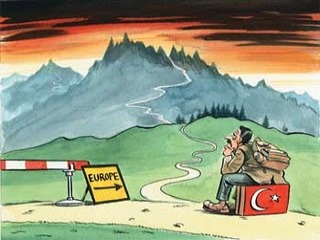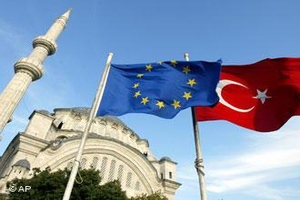Will Clinging to the EU and Atatürk Save the AKP?
By the Editors (vol. 1, no. 5 of the Turkey Analyst)
Just as it has been faced with the threat of dissolution, the AKP’s faith in Europe has been rekindled. More remarkably, the party is even clinging to the Atatürk legacy in an unprecedented way. The AKP’s change of heart is testimony to the party’s distress. Although displays of “kemalism”, in particular, are confusing, the new rhetoric has not convinced analysts that the party’s ideological orientation has been altered.
Turkey and the EU: Beyond the Cyprus Imbroglio
By the Editors (vol. 1, no. 4 of the Turkey Analyst)
 In December 2006, citing Turkey’s refusal to extend its customs union to Cyprus, EU Foreign Ministers suspended talks on eight of the thirty-five negotiation chapters in Turkey’s accession negotiations. But the importance of Cyprus has been overblown: Cyprus was only the superficial reason for the ‘slowdown’ decision. Both parties to the accession talks in fact needed to gain time and tend to internal matters. What does the current Turkish turmoil imply for the Cyprus issue and the broader future of Turkey’s EU accession negotiations?
In December 2006, citing Turkey’s refusal to extend its customs union to Cyprus, EU Foreign Ministers suspended talks on eight of the thirty-five negotiation chapters in Turkey’s accession negotiations. But the importance of Cyprus has been overblown: Cyprus was only the superficial reason for the ‘slowdown’ decision. Both parties to the accession talks in fact needed to gain time and tend to internal matters. What does the current Turkish turmoil imply for the Cyprus issue and the broader future of Turkey’s EU accession negotiations?
Turkey’s Internet Law: Another Chapter towards Absolute Censorship that Dooms EU Accession?
By Hendrik Müller (vol. 7, no. 6 of the Turkey Analyst)
Turkey recently promulgated a new Internet bill and swiftly used it to block access to the micro-blogging platform Twitter, and subsequently Youtube. In line with a longer history of fundamental rights violations, this step marks another chapter in Turkey’s recent path towards absolute censorship. In light of international and regional commitments, however, Turkey is increasingly at odds and may even risk forsaking its EU membership candidacy.

Fifty Years after the Ankara Agreement: the Need for New Commitments
By Ozan Serdaroğlu (vol.6, no. 17 of the Turkey Analyst)
Since the signing of Ankara Agreement in 1963, European enlargement towards Turkey has been evolving in a volatile momentum. Although Turkey’s eligibility for full membership has been confirmed by the agreement, the experiences accumulated during the last 50 years demonstrate that the Turkish case amounts to a “failed enlargement”, as the lack of real commitment and clear membership perspective dilutes the process. Even if the full membership continues to be an “officially” shared objective, the Turkish accession is likely to be prolonged during the upcoming years if a new vision is not introduced in light of these experiences.

Turkey-EU Relations Heat Up
by Richard Weitz (vol. 6, no. 5 of the Turkey Analyst)
After years of stalemate, recent months have seen renewed efforts to secure Turkey’s accession to the EU. French President François Hollande has adopted a more favorable position regarding accession than his predecessor. Following his election in 2012, Hollande’s administration advocated opening some of the eight chapters of the accession talks that were closed. Other EU officials have expressed concerns about the EU needing Turkey more than vice-versa. German officials have also adopted a more positive attitude towards Turkey’s accession drive. Meanwhile, Turkish officials are making moves, such as threatening to abandon the EU and seek membership in the Shanghai Cooperation Organization, presumably to give Ankara more leverage in the accession negotiations.




